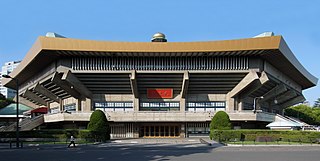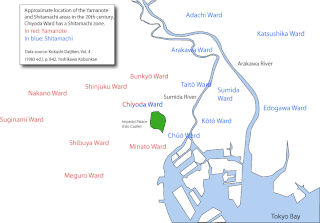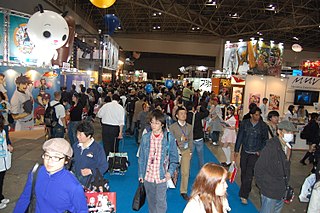 W
WEdo meisho zue is an illustrated guide describing famous places, called meisho, and depicting their scenery in pre-1868 Tokyo, then known as Edo. It was printed using Japanese woodblock printing techniques in 20 books divided among seven volumes. Initially published in 1834 and republished in 1836 with slight revisions—i.e., all during the late Edo period (1603–1867), it became an immediate hit and prompted a “boom” in the publication of further meisho zue.
 W
WImado ware is a type of Japanese pottery traditionally from Imado, presently a part of Asakusa, Tokyo.
 W
WThe following is a list of museums and art galleries in Tokyo. To use the sortable table, click on the icons at the top of each column to sort that column in alphabetical order; click again for reverse alphabetical order.
 W
WThe Independent Administrative Institution National Archives of Japan preserve Japanese government documents and historical records and make them available to the public. Although Japan's reverence for its unique history and art is well documented and illustrated by collections of art and documents, there is almost no archivist tradition. Before the creation of the National Archives, there was a scarcity of available public documents which preserve "grey-area" records, such as internal sources to show a process which informs the formation of a specific policy or the proceedings of various committee meetings.
 W
WNippon Budokan , often shortened to simply Budokan, is an indoor arena located in Chiyoda, Tokyo, Japan. Originally built for the inaugural Olympic judo competition in the 1964 Summer Olympics, its name translates as Martial Arts Hall in English. While its primary purpose is to host martial arts contests, the arena has gained additional fame as one of the world's most iconic musical performance venues. Budokan was a popular venue for Japanese professional wrestling for a time, and it has hosted numerous other sporting events such as the 1967 Women's Volleyball World Championship. Most recently, the arena hosted the Olympic debut of karate in the 2020 Summer Olympics as well as the judo competition at both the 2020 Summer Olympics and the 2020 Summer Paralympics.
 W
WThe Tokyo Anime Center (東京アニメセンター) is a permanent facility that has been created, to market anime to residents of Japan, as well as foreign visitors. The facility will host regular events, live radio interviews with creators and voice actors, and merchandising fairs. It includes the AKIBA3DTheater. It dubs itself as "The definitive "spot" for anime entertainment!"
 W
WTokyo dialect is a variety of Japanese language spoken in modern Tokyo. It is usually considered to be Standard Japanese, but there are some Tokyo-specific jargon and accent which are different in a number of areas and social classes.
 W
WThe Tokyo International Anime Fair also known as Tokyo International Animation Fair was one of the largest anime trade fairs in the world, held annually in Tokyo, Japan. The first event was held in 2002 as "Tokyo International Anime Fair 21". The event was held at Tokyo Big Sight, a convention and exhibition center in Tokyo Bay, in late March. Usually, the first one or two days of the fair were weekdays and the entrance was open only to industry members and the press; the last two days were scheduled on the weekend and the fair was open to the public.
 W
WThe Tokyo Metropolitan Symphony Orchestra , also known as Tokyō (都響), is one of the representative symphony orchestras of Japan. The Orchestra was founded in 1965 by the Tokyo Metropolitan Government, to commemorate the Tokyo Olympics.
 W
WThe Tokyo Philharmonic Orchestra is recognized as the oldest symphony orchestra in Japan, having been founded in Nagoya in 1911. It relocated to Tokyo in 1938 and has some 166 members as of 2005.
 W
WThe Tokyo Symphony Orchestra or TSO, was established in 1946 as the Toho Symphony Orchestra (東宝交響楽団). It assumed its present name in 1951.